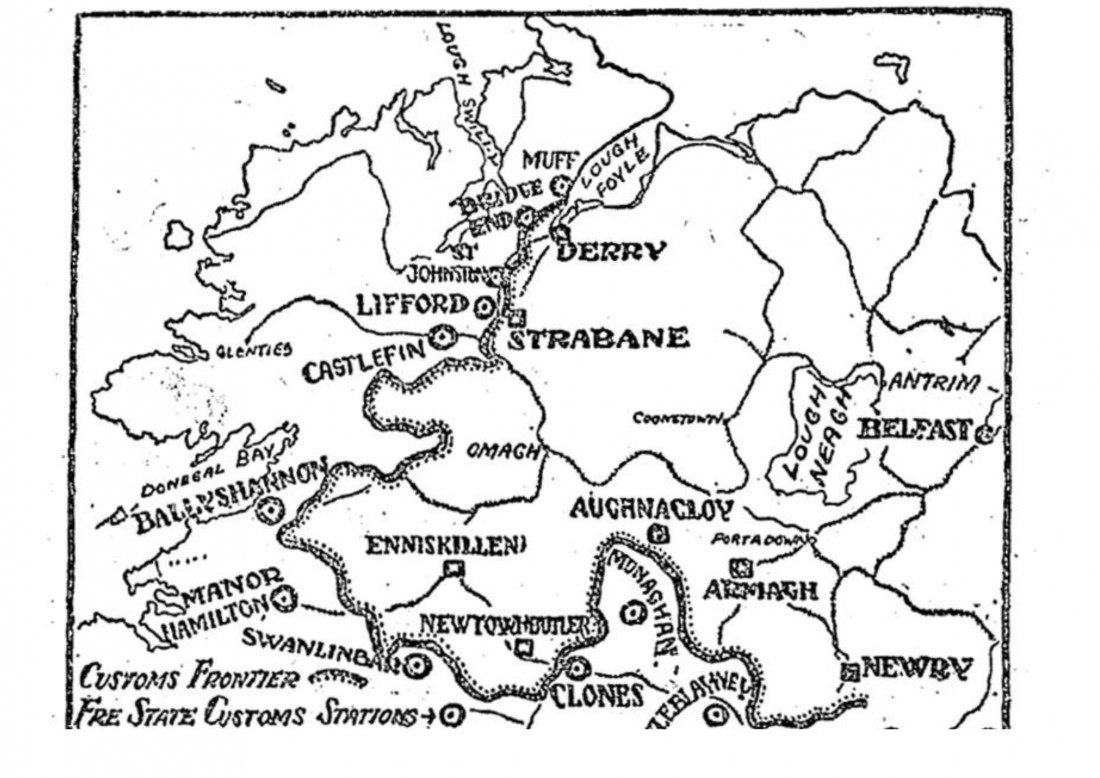DONEGAL County Museum in Letterkenny will host an online talk commemorating the introduction of the land border, which came into effect a century ago.
Historian Dr Cormac Moore will deliver the talk, ‘Land Border in Ireland – 100 Years On’, on Tuesday, April 4 at 7pm.
Dr Moore, author of ‘Birth of the Border: The Impact of Partition in Ireland’, will explore the impact of the customs border on many aspects of life on the island of Ireland since the land border became operative on April 1, 1923.
The partition of Ireland was the process by which the Government of the (then) United Kingdom of Great Britain and Ireland divided the island of Ireland into separate parliaments. The Government of Ireland Act 1920 became law on December 23, 1920, creating two home rule parliaments in Ulster and in Southern Ireland.
The Anglo-Irish Treaty in December 1921 contained a provision that would establish a Boundary Commission to decide the exact location of the border between the Irish Free State and Northern Ireland.
In March 1923, the Irish Free State introduced customs barriers with a system of duties to be paid on the movement of certain goods.
Goods could only be moved through approved border crossing points where they were inspected at a customs station.
These were introduced to assert independence and to put economic pressure on Northern Ireland.
Caroline Carr, Donegal County Museum, said there was widespread opposition to the move, particularly in border counties like Donegal.
“The customs barriers were enacted on April 1 by the Irish Free State , leaving little time for people and businesses to prepare. To cross the border, a carrier’s report had to be submitted to customs officials and the relevant fees had to be paid.
“People crossing the border were searched to prevent smuggling. There was a dramatic decline in trade across the border. Businesses were cut off from their customers and their established markets. There was widespread opposition, particularly in border counties. Donegal was economically cut-off from Derry. Railway services in and out of Donegal suffered considerable disruptions with some lines zig-zagging the border numerous times and customs examinations carried out at each crossing. Eventually it was decided to have custom examinations limited to the first point of entry at the border,” she said.
Writing in the Irish Times newspaper, Dr Moore said: “This weekend 100 years ago, on April 1 1923, a ‘temporary frontier’ on imported goods was placed on the boundary line between Northern Ireland and the Irish Free State. This ‘temporary frontier’ lasted for over 70 years, only rescinded due to the introduction of the Single Market throughout the European Union in 1993.
“It was the Free State government who introduced the measure that in essence created a hard land border on the island, and not the Northern Ireland government, with its prime minister James Craig claiming, ‘those in the south who proposed to erect that barrier wall, and not the north, would be responsible for partition. There was no such thing as partition if they had not a customs barrier between the north and the south’.
“Why then did the Free State government make such a decision which, on the face of it, seemed one of great folly that would (and ultimately helped to) cement partition?
“For years, Irish nationalists considered that self-government without fiscal autonomy was not real autonomy. Few fiscal powers were offered to Ireland under the different home rule schemes introduced from 1886 to 1920. While many in Ireland welcomed the prospect of Ireland managing its own affairs, it was jarring that the fundamental tools needed to do so – control of its financial affairs – would remain in British hands.
“The British would retain control of revenue, taxation and customs and excise. Many Irish people complained that in devising fiscal policies, the British catered for Imperial and English interests, not specific Irish ones which were very different.
“Under the Government of Ireland Act 1920, which was responsible for the partition of Ireland, Westminster was to retain control of customs duties, excise (with some exceptions) duties, excess profits duties, corporation profits tax and income tax, including super-tax. Of the taxes reserved to Westminster, customs and excise duties comprised the majority of tax revenue intake at the time, with £30 million of the total Irish revenue of £45 million for 1920-21 coming from customs and excise alone.”
People who wish to view the event are asked to phone (074) 91 24613 or email museum@donegalcoco.ie to book their place.










